In November 2018, Dot Bekker sat in front of her computer, about to purchase a ferry ticket from Barcelona to Tangier Med in Morocco. As she stared at the glowing screen, doubt crept in. “Did I want to do this, was I fooling myself, could I do this, should I do this, why was I doing this!?” she asked herself.
Bekker was dissatisfied with her life in Europe and had recently left a 22-year marriage. She yearned to return to Zimbabwe, the country where she was born and raised. After two and a half years of planning, and purchasing and modifying a blue 20-year-old Ford Transit Minibus, Bekker found herself wondering if it was all a mistake. Finally, she found her resolve and hit the enter key, completing the purchase. She would celebrate her 60th birthday in Africa.
From November 25, 2018, to August 8, 2019, Bekker took on West Africa as a solo female traveler, arriving home in Zimbabwe after a tough journey through Morocco, Western Sahara, Mauritania, Senegal, The Gambia, Guinea-Bissau, Guinea, Côte d’Ivoire (Ivory Coast), Ghana, Togo, Benin, Nigeria, Cameroon, Gabon, the Republic of the Congo, the Democratic Republic of Congo, Angola, Namibia, and Botswana. She recently self-published a book about the trip titled Going Home to Africa. It’s an honest account of the realities of life on the road, the kindness of the African people, and one woman’s quest to leave what she calls “a zombie-like existence” to follow an extraordinary dream.
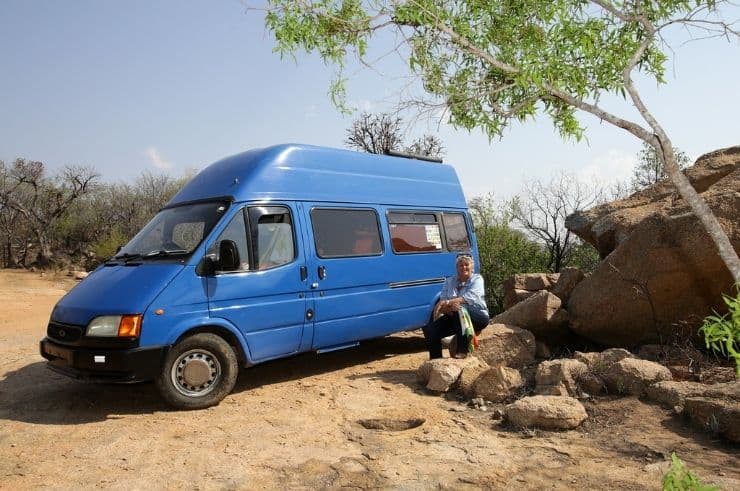
After being born and raised in Bulawayo, Zimbabwe, you left at age 22. What factors led to this decision?
I left Zimbabwe for South Africa in 1981 after a local violent outbreak between two factions in the country. Then, in 1997, I left South Africa for Europe when it was becoming more violent. My ex-husband and I moved there to follow his dream of completing a postgraduate degree. The overwhelming feeling when I left Africa was I don’t know what I can do. I felt so hopeless.
Since leaving Zimbabwe, I’ve lived in five other countries on two continents: South Africa, the UK, Portugal, Luxembourg, and Spain.
Whether it be culture, weather, scenery, or the unexpected, we are often drawn to other countries if we feel something is missing at home. But you experienced the opposite—you felt out of place in Europe and longed to return to Zimbabwe. What drew you home again after so many years?
Even though my schooling was British, a lot of my friends were British, and I could speak the language and fit in overall, I was always a foreigner. Every single week people would ask, “Where are you from?” After almost 21 years, I just got tired of that. In Europe, I was too loud, too forthright. In Africa, if you don’t stand up for your own cause, nobody’s standing up and fighting for you. And for the first five years, I didn’t mind the weather, but after that, it was just gray, cloudy, rain. I come from a city where we have blue sky almost all the time. I missed the sun and the warmth of the African people.
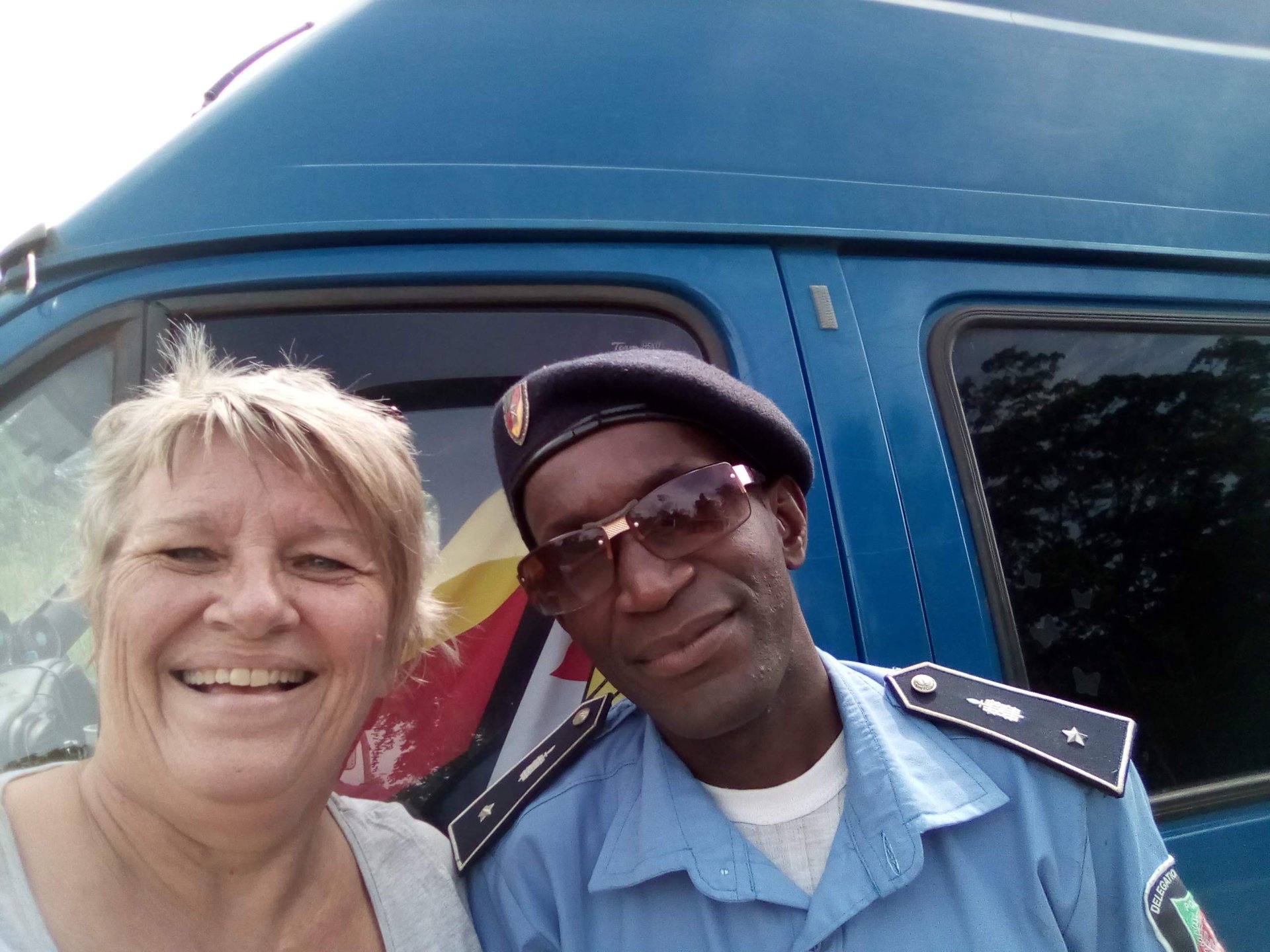
Why did you decide to drive to Zimbabwe rather than travel by airplane?
My niece, who came with me for 10 days from Gabon to Angola, did the Rallye Aïcha des Gazelles du Maroc in 2014. When I saw her doing that, it inspired me. I thought, I can get from Europe into Africa, and that eventually became my journey. Sometimes somebody does something like that, and you go, Wow, Wouldn’t that be interesting to do. And it opens the door.
You mention missing the warmth of the African people. How did this impact your trip?
When I left Europe, I was very depressed. I had just left a 22-year marriage. I thought, I’ve got to do this journey to figure out who the hell I am because I’m not this person. It used to depress me so much that nobody smiled on the trams and trains and busses in London. If I really wanted to irritate the British, I would get on the lift, stand in front of everybody, and go ‘Good Morning! How is everybody today?’ On an African bus, there are 10 conversations going on at the same time. That is home to me, you know?
When I was driving through Africa, I would smile and wave at people as I passed by. Ninety percent of the time, I would get a big flashy smile and a wave back. It just made my day. Along the way, there were instances where I broke down or got stuck, and within 15 minutes, there was always somebody to help. People often ask, ‘Weren’t you lonely?’ In Africa? You must be joking! You stop anywhere for 10 minutes, and there are people surrounding you to say hello. These experiences, over and over again, gave me my life back.
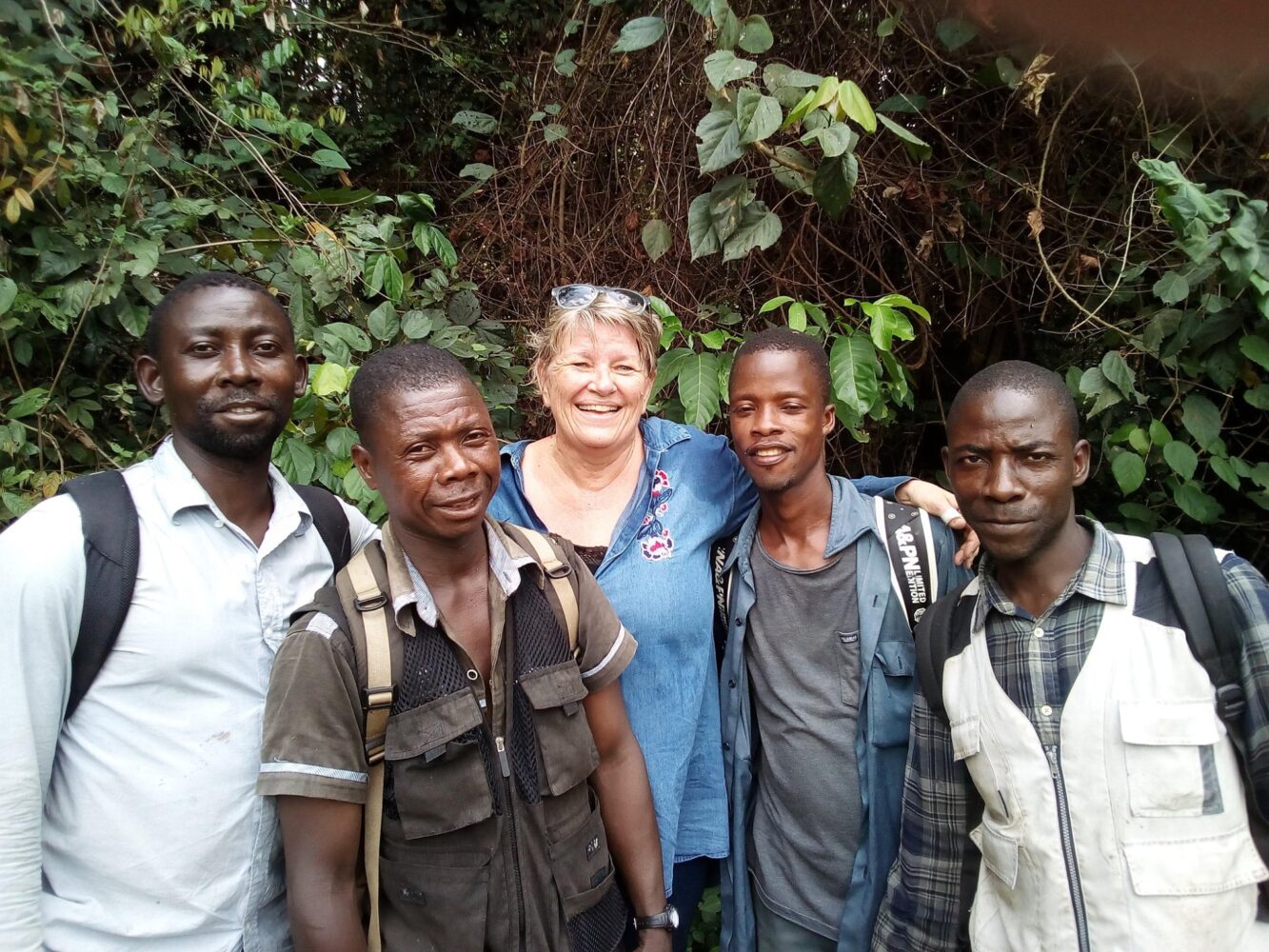
What did this trip home to Africa teach you?
I think the most important thing I learned was to let go and trust that everything would be fine. There were situations when I thought I’m never getting through this. But then it would be solved.
My van was stuck in the sand for the first time on Christmas Day in the south of Morocco. After assessing the situation, I checked my phone for a signal to see if I could find a YouTube video that would tell me how to get out of the freaking sand because I had never done it before. Suddenly, a 4×4 went past, and within 10 minutes, they had pulled me out. I was grateful beyond words. I called these experiences Africa Roadside Assistance. In the vast majority of Africa, there is no official roadside assistance, and consequently, people help each other out.


Why did you choose a 20-year-old Ford Transit van for the trip?
It was the only thing I could afford. That, and I had very specific requirements. The vehicle had to run on diesel [since] the fuel in Africa varies in quality. I wanted a mechanical engine because if I was stuck in the middle of the desert or somewhere, there wasn’t going to be anybody with a laptop coming to assess my engine. One of the other things that I insisted upon was to be able to get from the back to the front of the vehicle, so if I felt unsafe at any time, I could just skip out and go. I’ve only done that a handful of times, and most of those were in Europe.
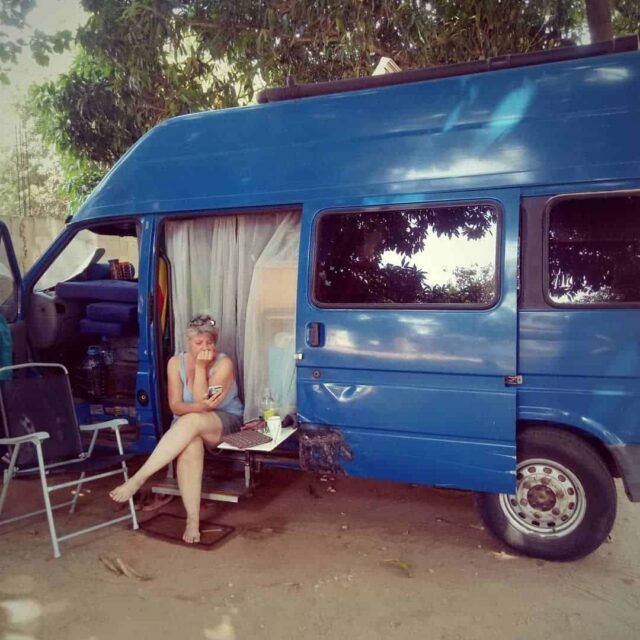
Which attractions would you recommend to overlanders who wish to visit Zimbabwe?
First of all, I would recommend the world-famous UNESCO World Heritage Site, Victoria Falls. It’s the largest waterfall in the world, and it is phenomenal. It ebbs and flows throughout the year, so you don’t necessarily want to see it during the dry season. At the height of the rains, it can be difficult to see the falls because the spray is so dense. I’ve seen it many times, and whenever I stand in front of it, [I wonder] how it’s possible that this much water continues to flow over the edge nonstop. It’s just immense.
The other thing you have to see is Great Zimbabwe, the largest ancient structure in sub-Saharan Africa. There’s a lot of controversy about who built it and why it was built, but it is made of structures of packed stone. There is no cement or any binding element in between them; they are perfectly cut and stacked, some of them are between 7 and 8 feet tall. It is also a UNESCO World Heritage Site.
We also have the UNESCO cultural landscape called Matobo Hills. It’s a vast [area] of balancing granite rock. Within the rock, you’ll find San rock art, caves, and drawings. Everybody who sees it says it’s a very spiritual kind of landscape.
Finally, our game reserve, Hwange [National Park], is nowhere as busy as Namibia, Botswana, or South Africa and just beautiful and quiet.
You founded Kusasa, a non-profit organization that raises scholarships for girls’ education in Zimbabwe. What was the inspiration behind this project?
Firstly, I wanted to do something alongside my journey that made it meaningful. You can throw money at just about anything in Zimbabwe. Everything needs money—whether it’s nature conservation, wildlife, children, water, economy, or medicine. Then I came across this astonishing fact that there was one thing that could transform the country and the continent, improve our socioeconomic conditions, GDP, community health, and reduce child and maternal mortality. The one thing we need to do is educate girls. Gender equality brings all of these things about, but we cannot achieve gender equality if we do not educate girls.
By the time I was 17 years old, most of the men in Zimbabwe were in the army. So it was the women who made stuff happen. That was the environment I grew up in. When I started to think about going home, one of the things I found out was the state of women in Africa. I had been gone for 20-odd years. I was suddenly looking at the research and the bigger picture, and I was horrified.

What is the status of girls’ education in Zimbabwe?
Girls receive a lot of education, and the numbers are good until high school, and then the numbers drop away drastically [due to] culture and poverty. If employers have to choose between a boy and a girl, you know the boy will get a job and be better paid than the girl, who is likely going to get married. I wanted to make sure that when the girls leave Junior school, they don’t fall into the early marriage trap or into trafficking or prostitution, which is rife at the moment because of our crushed economy.
I felt like if I could begin by educating just one girl, I would change the world for that one girl, putting a ripple into a vast ocean, so to speak. Sixty-eight percent of the population in Zimbabwe is rural, so the challenge is huge. I just constantly remind myself, I drove through Africa on my own for 20,000 kilometers; I can do this. The only way is to do one thing at a time.
You recently self-published a book, Going Home to Africa, which recounts the experiences of your trip home. Was the book something you envisaged all along?
I hadn’t thought about writing a book. But around halfway through the trip, people started telling me on my Facebook page that they wanted to read the book. I thought, Man! I’m just trying to get through this journey. I still have borders to cross. But it started to sow a seed in my mind, and by the time I reached Namibia, I started thinking about it and writing it in my head. I didn’t journal because there was no time—I was doing the driving, visas, borders, money, checking costs, researching routes. I did make voice notes and posted quite a bit on Facebook. My experience was so vivid, and I was literally in the present moment every day; once the trip was finished, it was hard not to remember all the things that happened.
I enjoyed the writing, too. I just got into a discipline. I get up really early in the morning, so I would be out by 4:30 a.m. Then, I would try to write between 2,000 and 3,000 words. Some days the word count was more like 500, and some days, it was nothing. But I tried to get into the routine of writing every day.
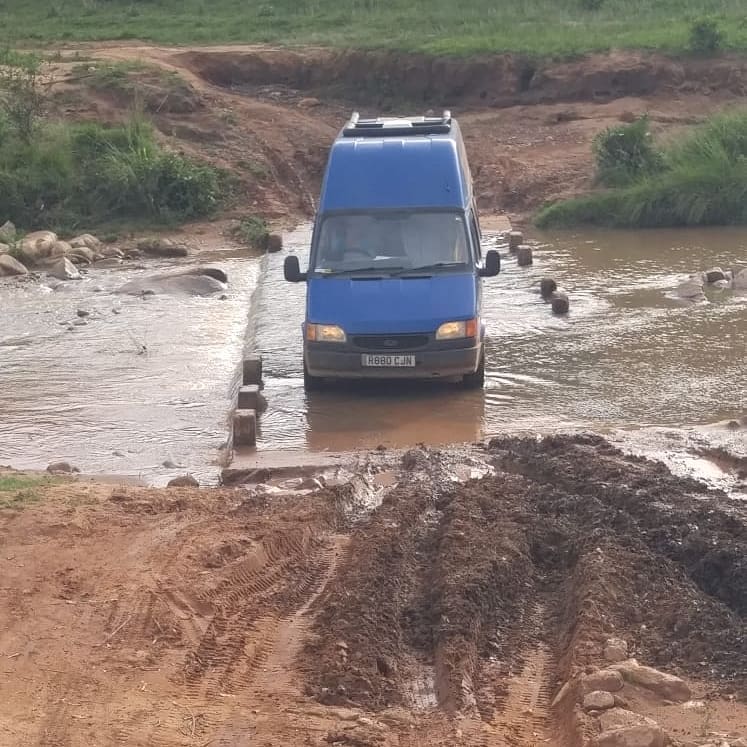
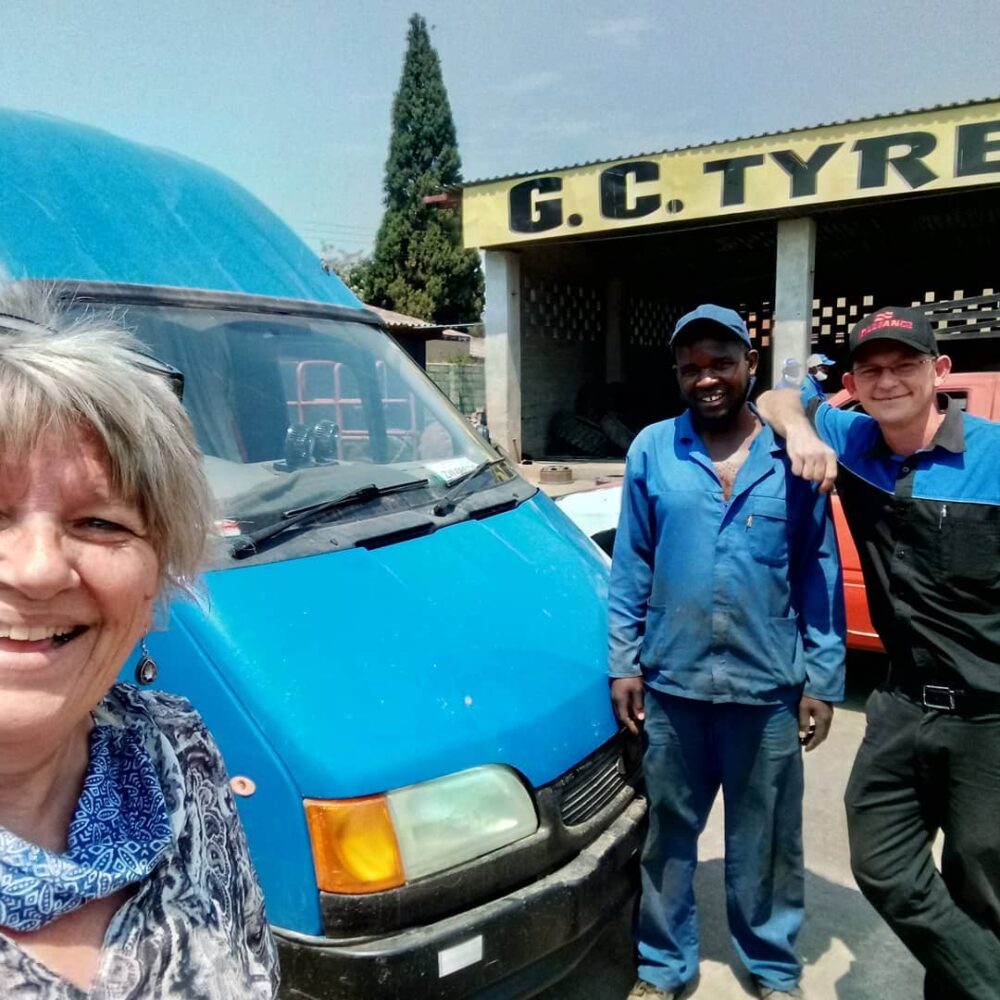
Where can people find your book?
It is available on Amazon worldwide in either paperback or Kindle. The e-book is also available on Kobo.
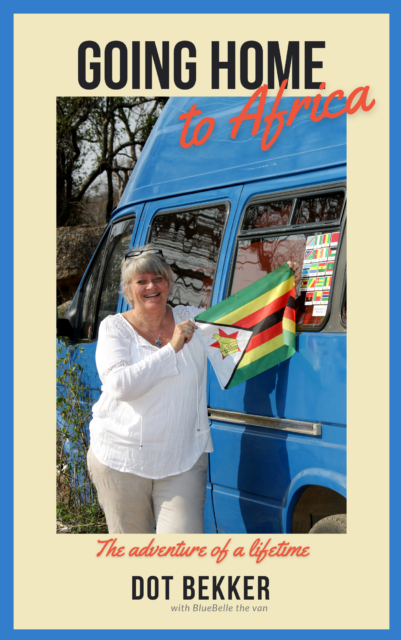
Follow Dot and BlueBelle the Van on Instagram and Facebook, or visit Dot at her website: goinghometoAfrica.com.


